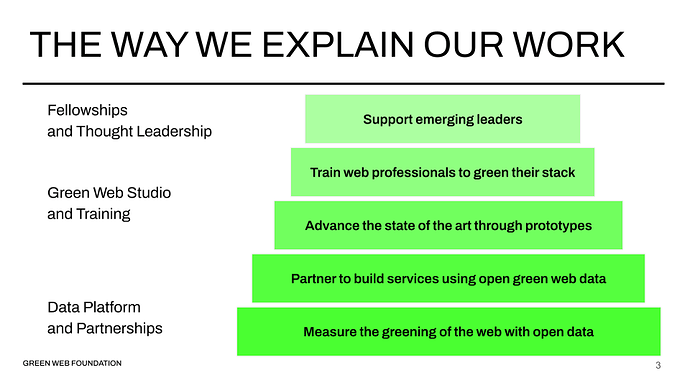Hi there,
I work at a small but fierce non profit, the Green Web Foundation, where we work towards a fossil free internet by 2030, using open data, open culture, and open source.
I wanted to share an opportunity that might interest some fellow open energy geeks here.
We recently launched our second year of Green Web Fellowship programme - we’re running 5 fellowships, running from Feb 2023 to Nov 2023, where we offer the following:
- a small stipend for your time - 8.4k EUR
- a budget to help fund a project you are working on - 2.5k to spend on collaborators, data, travel, etc.
- mentorship and training from a set of experienced practitioners working in green IT, climate justice campaigning, protocol design, community building and so on
In return, you commit to:
- Dedicate half a day a week, to the fellowship for 10 months
- Design and deliver a fellowship project that contributes to digital rights and climate justice
- Participate in weekly cohort calls and monthly online workshops while documenting your learning in the open
What would you have to work on?
To be honest, the brief is fairly wide - the purpose of the fellowship is to explore ideas that need more support, in the open, that would meaningfully help us get to a fossil free internet faster, with a diverse ecosystem of players building and maintaining the internet.
If it helps, you can think of the fellowships as the small bit in this diagram at the top explaining how wider activities as an organisation.
We use the fellowships to show that some ideas are possible, or re-frame how we see certain aspects of work as technologists working on climate. Some activities designed in the fellowships have become openly licensed training exercises usable by anyone, anywhere, and we use them ourselves in the training we offer.
Elsewhere, using a “studio” model, we develop ideas from the fellowship into prototypes or interventions to help larger players develop an awareness of where electricity comes from - like the work we’re doing to build carbon intensity data into a major browsers.
Alternatively, fellowship work might help extend the datasets we publish about which providers are moving fastest on shifting off fossil fuels, or how to even think about the carbon intensity of electricity in the first place.
In the openmod context it might be about making sure more parts of the world are able to do the modelling needed to inform effective, equitable transition from fossil fuels, to extend some PyPSA work. It might be researching how demand flexibility from datacentres could be a valuable resource in its own right, to help integrate more renewables into current and future grids. It might be modelling how carbon pricing might be used to offer a foundational amount of universally accessible, free, meaningful connectivity powered by green energy, riffing off existing ideas around universal basic service provision of green energy services or mobility services we see elsewhere.
Earlier this year, I asked for help on the openmod forums helping make arguments to get carbon intensity data from the United Nations Framework Climate Change Commitee (UNFCCC), and about licensing data in general. We able to get the data released as a result, bundling it into open source software, and recently have been doing some work to annotate every public ip address on earth with geo-located carbon intensity data. This ended up informing a paper for carbon-aware ipv6 routing that the Internet Architecture Board accepted in their call for ideas to achieve a greener internet - this might be an area of interest too.
Why the internet?
Here’s one of our core beliefs:
The internet is a global, public resource and should be fossil-free by 2030.
We see the internet the way we see shipping - it’s something that we don’t really think about, but it’s essential to modern life. Like shipping, it’s something we need to decarbonise, but there isn’t consensus on how best to do it, or how to pay for it.
So, it’s a space where new ideas and data informed discussions would be welcome, and where we think ‘open’ as an approach can help lead to more equitable and just outcomes.
If this resonates with you, I’d invite you to apply at the link below, but please apply before Dec 8. We have an open webinar on Dec 5th for people wanting to know more on a shared call.
Thanks!
